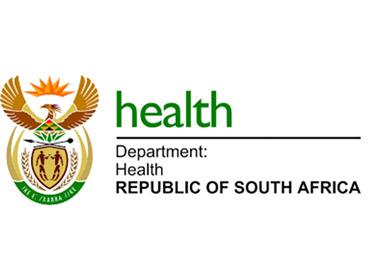Parliament, Wednesday 15 March 2023 – The Portfolio Committee on Health was briefed by the Parliamentary Legal Services and the State Law Advisors on the National Health Insurance (NHI) Bill.
This committee briefing forms part of the legislative processes for the NHI Bill. The briefing forms part of the process the committee must undertake to ensure that the Bill goes through the proper parliamentary processes. The committee has conducted a public participation process of provincial and virtual public hearings. Following that, the committee received inputs from the Department of Health (which is the sponsor of the Bill) responding to the inputs and recommendations received during the public participation process. Thereafter, the committee conducted clause by clause deliberations of the Bill.
Committee Chairperson Dr Kenneth Jacobs said the briefing today provided the committee with a legal opinion on the Bill. Further engagement will resume next week when the members meet to discuss the legal practitioners’ input.
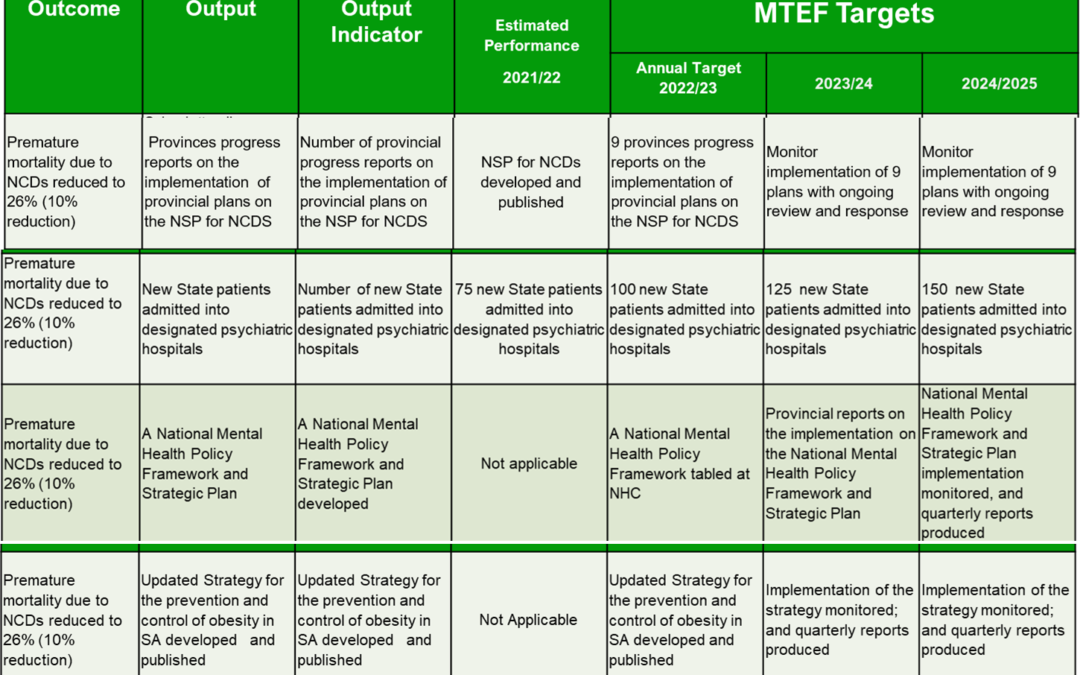
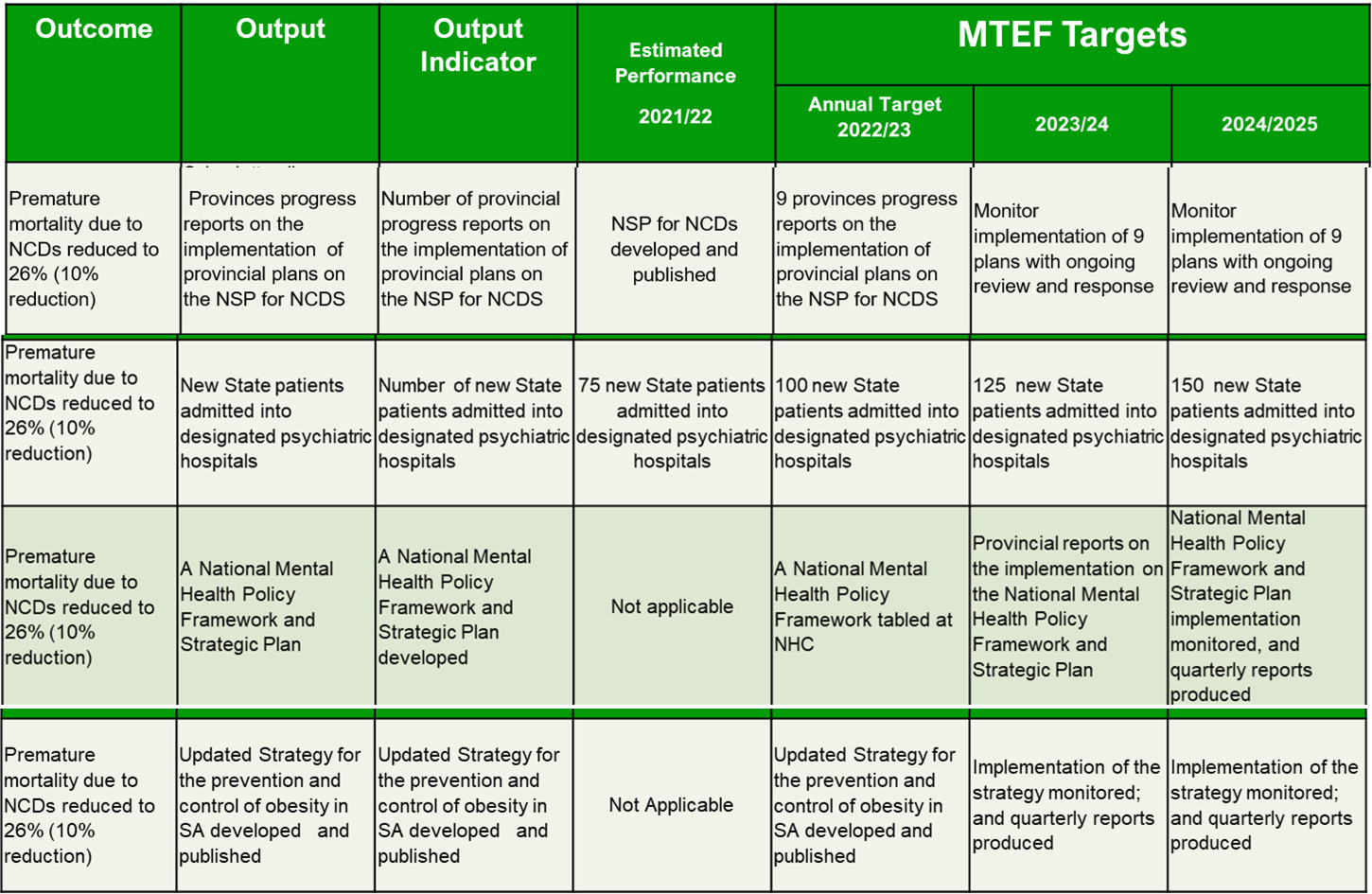
NCDs related outcomes for APP 202s/2023
NCDs are a neglected priority in the National Department of Health (NDoH) Annual Performance Plan 2022/23 (APP) which expires at the end of March. Only 4 /18 outcomes in programme 3 are NCD-related.
The bottom 2 rows in the table, require the re-development of national policies for mental health and obesity. Transparency and an inclusive process are problematic.
Our Constitution calls for the meaningfu involvement of civil society and people living with NCDs. Together these conditions impact millions of South Africans and place increasing burden on the health system.
It would also be great to see the reviews of the existing policies which should come before a new policy.
The NCDs+ National Strategic Plan 2022-2027, launched in May 2023, (see the top row in the table) Implying that the provinces will have be close to publishing the impemetion plans for obesity, diabetes and hypertension. I know there is lots hard work getting the plans ready. The Medium-Term Strategic Framework 2019-24 makes it clear that NCDs budgets and implementation must happend in at the sumbnational or provinical level.
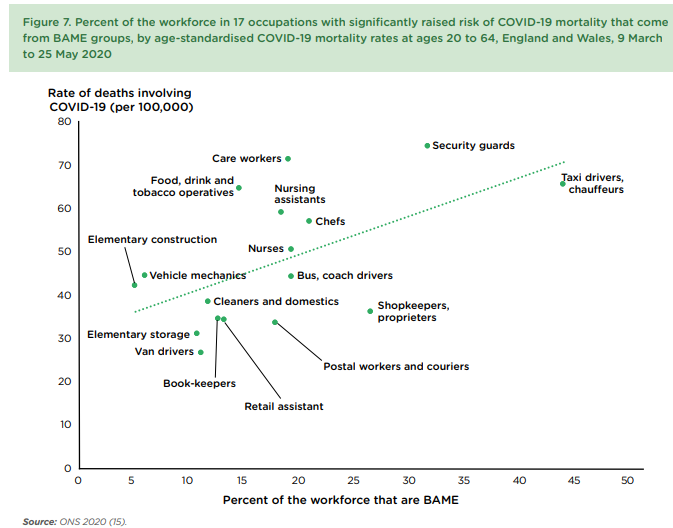
As the UK emerges from the COVID-19 pandemic ‘Build Back Better’ has become the mantra. Important, but we need to Build Back Fairer. The levels of social, environmental and economic inequality in society are damaging health and wellbeing
It was the principles of fairness and the need to do things differently that animated the concrete recommendations we set out in our February 10 Years On Review, just before the pandemic hit with such devastating intensity. Inequalities in mortality from COVID-19 and rising health inequalities as a result of social and economic impacts, have made such action even more important
The aim of this report is three-fold:
- To examine inequalities in COVID-19 mortality. Focus is on inequalities in mortality among members of BAME groups and among certain occupations, alongside continued attention to the socioeconomic gradient in health – the more deprived the area, the worse COVID-19 mortality tends to be
- To show the effects that the pandemic, and the societal response to contain the pandemic, have had on social and economic inequalities, their effects on mental and physical health, and their likely effects on health inequalities in the future
- To make recommendations on what needs to be done
We urge that the Government learns the lessons of the pandemic, prioritises greater equity and health, and works urgently to reduce the severity of the health crisis caused by the economic and social impacts of the pandemic and the societal response.
#BuildBackFairer builds on recommendations in the 10 Years On and Marmot 2010 reports, which were to:
- Give every child the best start in life
- Enable all children, young people and adults to maximise their capabilities and have control over their lives
- Create fair employment and good work for all
- Ensure a healthy standard of living for all
- Create and develop healthy and sustainable places and communities
- Strengthen the role and impact of ill health prevention
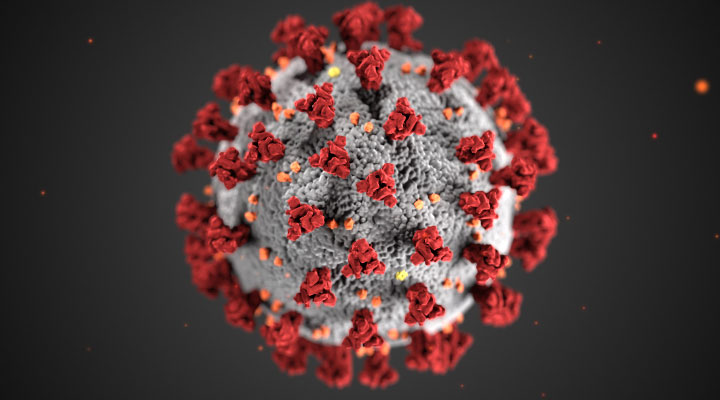
[vc_row][vc_column][vc_column_text]
20 civil society alliances in mainly low- and middle-income countries, including the South African Non-Communicable Diseases Alliance, were awarded grants to accelerate the response to the COVID-19 pandemic. The grants, made by the first Civil Society Solidarity Fund on Non-communicable Diseases (NCDs) and COVID-19, were announced today by the global NCD Alliance during a high-level online event.
Todd Harper, President of the global NCD Alliance, said: “The COVID-19 pandemic shows many intersections between COVID-19 and NCDs. People living with NCDs are more vulnerable to COVID-19, with a substantially higher risk of becoming severely ill or dying from the virus. The pandemic also impacts the poorest communities around the world and the most vulnerable people in every country. The civil society solidarity fund was born out of the need to tackle NCDs as fundamental to health security and to prevent a reversal of gains made in NCDs prevention and control around the world”.
The fund, totalling $300,000, competitively awarded grants of up to US$15,000 to national and regional NCD alliances. The purpose of the grants is to support alliances to address the critical needs of people living with NCDs during COVID-19 via advocacy and communication activities that will support stronger organisational stability and resilience.
Dr Vicki Pinkney-Atkinson, Director of SA NCDs Alliance, states: “Until the COVID-19 pandemic exposed the inequitable fault lines in the health system, NCDs+ are a neglected priority in South Africa. In South Africa, 99% of the people who have died because of COVID-19 are those of us living with NCDs+. The funding is a cause for celebration in an otherwise dark time with record daily number of new infections and deaths. It will allow the participation of people living with NCDs+ to building back a better health system with equity for NCDs prevention and treatment. We can work alongside the government to ensure that NCDs public health plans are equal to those for HIV and meet our needs.”
Katie Dain, CEO of NCD Alliance, added: “This is a first-of-its-kind fund to support NCD civil society organisations (CSOs) response to COVID-19. During pandemics, momentum in several health and sustainable development issues, notably HIV/AIDS, Ebola and climate change, have repeatedly reinforced the critical role of CSOs and community-led efforts in accelerating action from local to global levels. Civil society are proven campaigners, change agents, experts, implementers and watchdogs”.
The millions of South Africans living with NCDs+ are a critical at-risk, vulnerable group during COVID-19. No community is spared from the impacts of COVID-19 or NCDs, affecting rich and poor alike. The COVID-19 pandemic, despite its huge negative impact, offer a policy window of opportunity to work together to build a better health system and society free from the preventable suffering, disability, and death caused by NCDs.
The NCD Alliance Civil Society Solidarity Fund on NCDs and COVID-19 is possible thanks to generous financial contributions of global NCD Alliance’s supporters: The Leona M. and Harry B. Helmsley Charitable Trust, Access Accelerated, Takeda, AstraZeneca and Upjohn (Pfizer). The Fund received 45 submissions from national and regional alliances across all regions, which were reviewed by a selection committee. The Fund recognises the essential work of NCD advocates, which now becomes even more critical than ever to ensure political and media attention to the needs of people living with NCDs as one of the most vulnerable groups to COVID-19.
The recipients of the Civil Society Solidarity Fund are from Africa, Asia, Europe, Eastern Mediterranean and Latin America:
- ACT Promoção da Saúde (Health Promotion, Brazil)
- Alianza ENT Uruguay (NCD Uruguay)
- Alliance MNT Benin;
- Bangladesh NCDS Forum
- Burundi NCD Alliance
- Cambodian NCD Alliance
- Cameroon Civil Society NCD Alliance
- Coalition MNT-Togo;
- East Africa NCD Alliance;
- Healthy Caribbean Coalition;
- Healthy Latin American Coalition;
- Healthy Philippines Alliance
- Jordan NCD Alliance
- NCD Alliance Nigeria;
- South African NCDs Alliance
- Slovenian NCD Alliance
- South East Asia Regional NCD Alliance
- Trinidad & Tobago NCD Alliance
- UK Working Group on NCDs
- Zambia NCD Alliance
[/vc_column_text][/vc_column][/vc_row]



